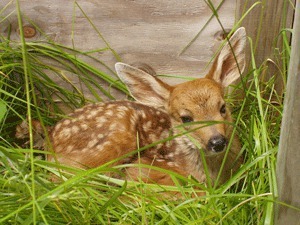by Shona Aitken
Wolf Hollow Rehab Center education coordinator
“Poor little thing! He’s all on his own! He must have lost his mommy!”
It is the time of year when people find tiny fawns lying curled up in the grass with no adult deer in sight and presume they are lost or orphaned and need to be rescued. In fact, they are doing exactly what they should be doing – lying still and quiet waiting for mom.
Most of the black tailed deer fawns on the islands are born in May, and for the first couple of weeks, are not strong enough to follow mom for any distance. Their legs are too weak and wobbly to push through brush, jump over fallen logs or run away from danger, so their mother leaves them in a nice sheltered spot while she goes off to feed. The fawn’s job is to lie quiet and still and wait for her to return, protected by the camouflage of its spotted coat and the fact that it has almost no scent to attract predators.
After a few hours (up to 6 or 8 hours is not unusual) the doe returns to nurse her fawn, then may move it to another spot nearby before going off to feed again. By the time the fawn is about three weeks old it has grown much stronger and is able to spend more time following its mother.
Each year we raise injured fawns, or orphans whose mothers have been killed by cars or dogs, but, sadly, we also receive fawns that have been “kidnapped” by well-meaning people. If we know exactly where the fawn was found we can quickly return it, but too often it has been kept overnight, fed inappropriate food, or passed from one person to another, so we are not able to take it back where it came from.
Ideally, does leave their young fawns in secluded spots in the woods, but occasionally fawns turn up in unusual places such as a construction yard, on a golf course green or on someone’s back deck, right under the barbecue!
This may be the result of a mother’s misjudgment, but fawns’ strong instincts to drop and freeze at the slightest danger can also get them into trouble. This is most obvious when they are crossing roads. The doe walks across the road with her little fawn tottering along behind. A car comes round the corner, the doe leaps off into the woods and the fawn instinctively drops flat and lies still. People then presume it is hurt and “rescue” it. What should you do in this situation? Stop the car a reasonable distance from the fawn. Walk up slowly and quietly and look it over. Are there any signs of injury? If not, slip your hands under the fawn’s chest and belly, handling it as little as possible, and gently carry it a short distance off the road before laying it down in a suitable spot in long grass or under some bushes. Then leave. Chances are good that the doe will return for her fawn when she is sure the coast is clear.
We raise fawns each year and have suitable formula and enclosures, but it is far better for a fawn to be raised by its mother, so, if you find a little, spotted fawn lying curled up in the grass, please don’t touch it. Leave it there so mom can find it when she returns.
If you are concerned about a fawn, call Wolf Hollow at 378-5000.




